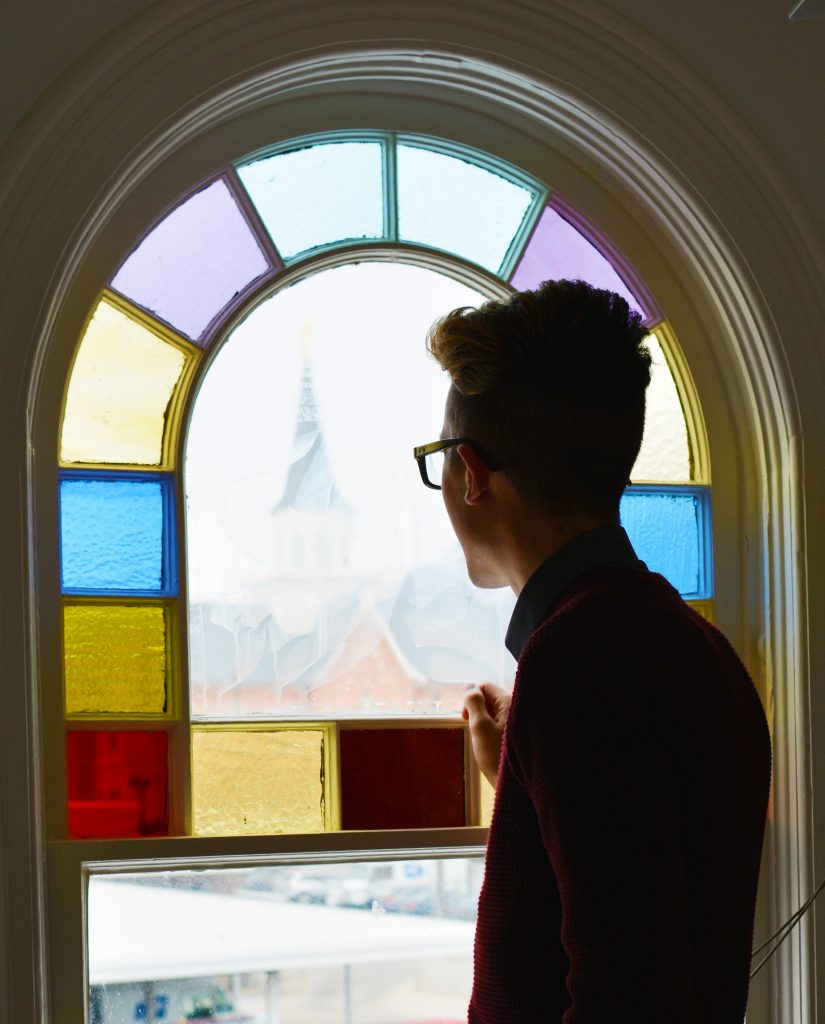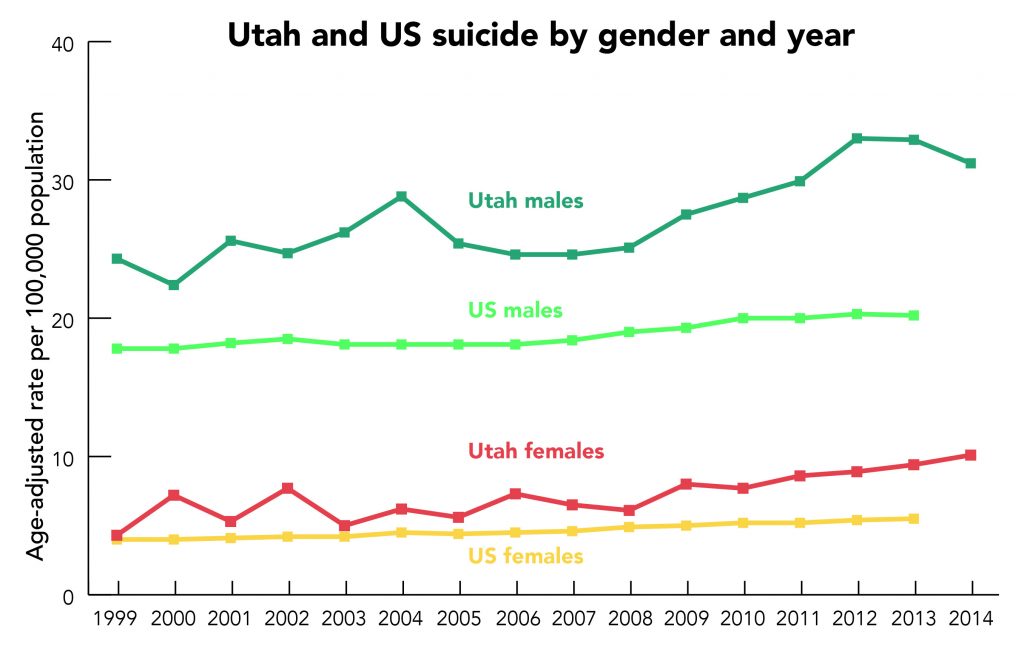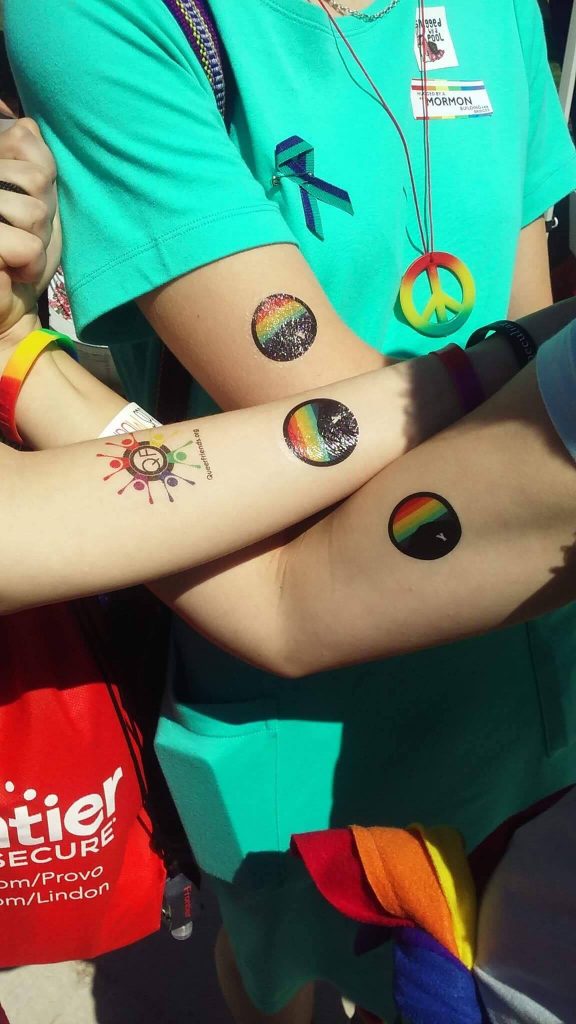
BYU senior Brenna McGrath was in the process of slowly overdosing herself with medication when her class held a panel for BYU’s unofficial LGBT club, Understanding Same-Gender Attraction.
“USGA saved my life,” said McGrath, who identifies as bisexual. “It’s a pretty common story for us in the club.”
However, another common story for LGBT individuals and their friends is the alternate ending to McGrath’s story: crippling depression and suicide.
“I have gone to the hospital in the past year two different times to visit LGBT BYU students who had attempted suicide. I hope that never happens again,” said BYU civil engineering major Dillon Harker, who identifies as gay. “I don’t want to have to visit another friend in the hospital.”
The rate of suicide attempts is four times greater for LGBT youth than straight youth, according to the Trevor Project, a leading national organization providing crisis prevention to LGBT youth.
Just as shocking is Utah’s own suicide rate: 23.9 suicides per 100,000 population for people ages 10 and up in 2013. The U.S. suicide rate for people ages 10 and up was 14.9 per 100,000 population during that same period.

Utah’s youth suicide rate has nearly tripled since 2007 and is now the leading cause of death among 10 to 17-year-olds. A host of news articles points to the treatment of LGBT youth and young adults as the cause.
Though BYU has no formal support groups for LGBT students, it does offer access to on-campus counseling and an unofficial LGBT group called Understanding Same-Gender Attraction, which holds its meetings off campus.
USGA surveyed 92 primarily LGBT BYU students in Winter 2015 and found 52 percent “at some point in life considered self-harm.” Fifty-two percent also indicated in the survey they felt they didn’t have a go-to friend.
The second statistic should cause worry, according to BYU psychology professor Dee Higley. Higley studies depression from a biological standpoint, with the emphasis of his study being the impaired serotonin system that people with a tendency toward depression have.
“If you live in an environment where your community is very supportive, you have less stress and less stress hormones,” Higley said. “They (community members) are giving you the capacity to cope with things that you wouldn’t normally cope with.”
Higley said studies show psychosomatic illnesses are reduced by having a supportive partner or community.
McGrath herself said the sense of community she found at USGA saved her life. However, she said the lack of community she and others have felt in the LDS Church have at times induced anxiety and panic attacks.
“Church has been a toxic environment for me,” McGrath said. “I do get panic attacks. I do feel isolated.”
For McGrath, church culture produces the opposite effect of providing support. While supportive spouses are also seen to decrease mental distress, being gay and Mormon means going through life without a marital partner in many cases.
“It was a weight on me, this reality that I was going to be alone forever,” said BYU senior Austin Daw, who identifies as gay. “I was always going to be that uncle who was alone at family parties.”

Daw said it would help him if people were more conscious of how their words affected other people. He also wants them to recognize there are more gay people at BYU than most realize.
“It was always interesting when I was in class and someone said, ‘Oh, the gay people,’ and I’m thinking, ‘OK, I am in this class.’ It’s like a constant ‘othering’ effect, making gay people or LGBT people to be not Mormon and not at BYU,” Daw said. “That’s not true.”
Harker also addressed this “othering” effect.
“We are not the other,” Harker said. “We are an important part of BYU.”
When Debra Coe became a member of the Utah Commission on LGBT Suicide Awareness and Prevention, she said she didn’t have a direct connection to anyone LGBT — at least, she didn’t think she did. After seeing her love and compassion toward the LGBT community, her son, a college student, came out to her as gay.
“And then we came to find out later that he really struggled with (depression),” Coe said.
Coe said she learned even well-intentioned conversations about gay people can affect LGBT individuals. The silence and lack of defense can be just as “deafening,” Coe said.
“As we’re making comments about how terrible gay people are, they are internalizing this as, ‘That’s me,’ and feeling like there’s nothing they can do about it,” Coe said.
Higley said this feeling of helplessness can be detrimental.
“(Helplessness) is what happens when you hear every day that you don’t fit, that if you just read your scriptures more, if you prayed more, you’d overcome your same-sex attraction,” Higley said. “You begin to believe ‘there must be something wrong with me.’”
Liza Holdaway, who identifies as bisexual, said she has seen this thinking in her own life and in the lives of her friends. Because some LGBT people believe when they die they will be straight or “normal,” Holdaway said her friends will sometimes reason, “Why don’t I just die right now? Why don’t I just kill myself right now?”
Holdaway dismisses this detrimental thinking and instead tries to think about the good things she is doing and the difference she is making. She said it took years for her to come to this point, and that she and many other LGBT BYU students are still grappling with their identity and place in society.
Stephanie Larsen said it’s important to have a safe environment for LGBT people and their family members to work through the struggles that come with being part of this community. She and others in the local community have come together to open Provo’s first LGBT resource center, called Encircle.
USGA and other organizations have tried to take the same approach, creating a safe and loving environment for individuals to work through what it means to be part of the LGBT community or to have an LGBT child.
“We want Encircle to be a very safe space for families, where they can keep their religious values and work through it,” Larsen said.
UVU student and Encircle marketer Jacob Dunford, sitting beside Larsen, chimed in.
“No prescriptive outcomes,” Dunford said. “Just love.”
(Timeline by Jessica Olsen)




